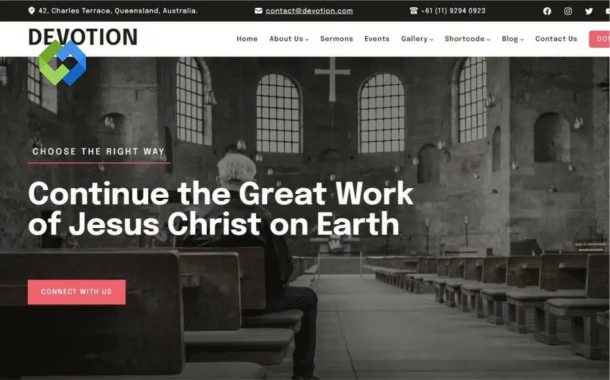Devotions are short, inspiring messages that connect with people on a personal level. Sharing devotions online helps spread positivity and encourages reflection. They can reach a wide audience, especially when shared through a website. Adding devotions to your digital content builds engagement with readers.
Table of Contents
Table of Contents
Setting Up a Devotional Website on WordPress
1. Choosing the Right Hosting and Domain
Start by selecting a reliable hosting provider to ensure your website runs smoothly. Hosting affects the speed and uptime of your site, so research providers carefully. Choose a domain name that reflects the theme of your devotions, making it simple, meaningful, and easy to remember. Hosting providers often offer bundled domain registration services, simplifying the setup process. A .com or .org domain is ideal for professional appeal.
2. Installing WordPress
Most hosting providers offer one-click WordPress installation, saving time and effort. After installation, log in to your WordPress dashboard, where you’ll design and manage your devotional website. This dashboard is user-friendly and gives access to all tools you need, from theme customization to plugin installation.
3. Selecting and Customizing a Devotion-Friendly Theme
Pick a theme that complements devotional content and creates a serene atmosphere. Look for clean, minimal designs with soothing colors and a focus on readability. Popular free themes like Astra or premium ones like Divi are good options. Customize the theme’s colors, fonts, and layout to align with your vision and ensure an engaging visitor experience.
4. Adding Essential Plugins
Install plugins that enhance functionality and improve the user experience. For devotional websites, plugins for daily updates, scripture display, or prayer request forms can be valuable. Popular options include Jetpack for site performance, WPForms for user interaction, and MailPoet for newsletters. These tools make managing your site easier and more interactive.
5. Creating Key Pages and Features
Set up important pages like About Us, Devotions, and Contact. The About Us page can share your mission and purpose. Use categories or tags to organize your devotional content for easy navigation. Add a blog section for regular devotional posts, ensuring fresh updates to engage visitors. Widgets like verse-of-the-day or prayer requests can enhance the experience further.
Creating and Managing Devotional Content
Writing Inspirational Posts and Daily Devotions
Focus on writing short, meaningful messages that inspire and uplift readers. Devotional content should be easy to read, with clear takeaways. Use personal stories, scripture verses, or motivational quotes to connect with your audience. Create a consistent schedule, like daily or weekly updates, to keep readers engaged and coming back for more.
Using Categories and Tags Effectively
Organize your content with categories and tags to make it easy for readers to navigate. Categories group similar topics, like “Morning Devotions” or “Faith and Hope.” Tags highlight specific details, such as “Patience” or “Forgiveness.” Proper organization improves the user experience and helps visitors find the content they need.
Scheduling Devotions for Regular Updates
Consistency is key in devotional content. Use WordPress’s scheduling feature to publish posts automatically at set times. This ensures your devotions reach your audience regularly, even if you’re busy. Plan a content calendar to stay ahead and maintain a steady flow of posts.
Incorporating Multimedia Elements
Enhance your devotions with images, videos, or audio recordings. Visual elements like calming backgrounds or nature photography can make your posts more appealing. Consider adding audio readings of devotions for a deeper connection with readers. Multimedia adds variety and keeps the audience engaged.
Enhancing User Experience
Design a Calm and Reflective Interface
Choose a clean and simple design that promotes focus and serenity. Use soft colors, easy-to-read fonts, and ample white space to create a peaceful browsing experience. Avoid clutter and ensure that key elements like navigation menus and devotionals are easy to locate. A calm design sets the right tone for devotional content.
Optimize for Mobile Accessibility
Many users access devotional websites from their phones. Ensure your site is mobile-friendly by choosing a responsive theme and testing its layout on various devices. Make sure buttons, text, and images adjust smoothly to different screen sizes. A mobile-optimized site improves accessibility and user satisfaction.
Add Interactive Features
Incorporate interactive features like prayer request forms, comment sections, or discussion forums. These features encourage visitors to engage with your content and share their thoughts. Adding tools like a verse-of-the-day widget or a daily reminder can keep users returning for regular inspiration.
Improve Site Navigation
Simplify navigation with clear menus and links. Use categories and tags to help visitors find content easily. Add a search bar to allow users to locate specific topics or devotions quickly. Organized navigation reduces frustration and keeps readers exploring your site.
Enhance Loading Speed
Fast loading times are essential for retaining visitors. Use lightweight themes, compress images, and enable caching to speed up your website. A faster site ensures a smoother experience, keeping readers engaged and reducing bounce rates. It also helps improve search engine rankings.
Promoting Your Devotional WordPress Website
Promoting your devotional WordPress website begins with social media. Share your posts on platforms like Facebook, Instagram, or Twitter using visually appealing graphics with scripture or quotes. Post regularly and engage with followers by responding to comments. Joining faith-based groups or communities can help you connect with like-minded people and grow your reach.
Email newsletters are a great way to stay connected with your audience. Build a mailing list by offering free resources, like devotional guides, for signups. Use tools like MailChimp to send regular updates with your latest devotions. Newsletters keep your audience engaged and encourage them to revisit your site.
SEO is essential for increasing visibility. Use keywords like “daily devotions” naturally in your posts and write engaging meta descriptions. Adding alt text to images improves search rankings. Collaborating with other bloggers can also help you reach new audiences and grow your network.
Maintaining Your Devotional Website
Keeping your devotional website well-maintained is crucial for a smooth and engaging user experience. Regular updates are the first step. Update WordPress, plugins, and themes to ensure security and functionality. Outdated components can make your site vulnerable to cyberattacks or cause performance issues. Additionally, check for broken links and outdated content to maintain credibility.
Backup your website frequently to prevent data loss. Many hosting providers offer automatic backups, or you can use plugins like UpdraftPlus. Having backups ensures you can restore your site quickly in case of errors or crashes. It’s a simple yet essential step to safeguard your content.
Monitor your website’s performance to improve loading speeds and resolve any technical glitches. Use tools like Google Analytics to track website visitor behavior and identify areas needing improvement. A fast, user-friendly site keeps readers engaged and encourages them to return.
Conclusion
Creating a devotional website on WordPress is a rewarding way to share spiritual content with a wider audience. By choosing the right theme, adding essential features, and maintaining your site regularly, you can build a space for inspiration and connection.
Promoting your site through social media, SEO, and email newsletters will help you reach more people. Consistently posting new devotions and interacting with your audience strengthens the community.














